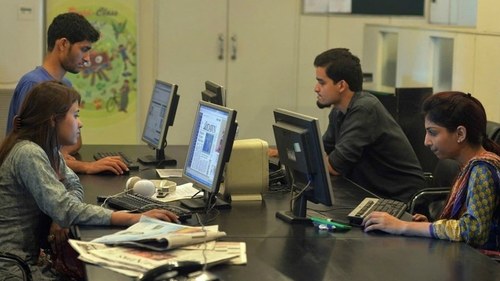Dr Shamshad Akhtar, a macroeconomist and the previous caretaker finance minister, said that no one believed a woman could stabilise the economy while recounting her “compressed” time in the finance ministry on Tuesday.
While speaking as the chief guest at the Overseas Investors Chamber of Commerce and Industry (OICCI) women empowerment awards, Akhtar talked about her career in Pakistan and abroad, more particularly her time in the finance ministry, where she said, “Nobody could believe that I could stabilise the economy — I’m not trying to talk about myself. I’m talking about [being] a woman. They thought only men knew it.”
“So women can do it, trust me,” she stressed, adding that women had to empower themselves.
“None of the civil servants and bureaucrats want to lift the game. You have to do it alone. I just wanted to share this with you,” she stated.
“Have confidence in you. Trust yourself. There will be difficulties and there will be criticism. Take it with grace,” she added.
Dr Akhtar also remembered her time when she first came into the finance ministry when she was “bombarded” with presentations, perhaps because it was thought she was a “naive economist, but also because I’m a woman”.
She said she had to tell ministry officials that she was “an economist with inclusive propositions”.
“I know the word inclusiveness can be a jargon here but it is a real word from the background I come from. And so is resilience, you have to be resilient to survive.”
She also reminisced about her time in the United Nations where she said it was a difficult task for her to convince people about sustainable development. Eventually, she said, people did take it up, particularly the “few women” in finance like Christine Lagarde and Janet Yellen.
“It takes women to understand the architecture of the sustainable development in finance and climate,” she said, “Why? Because they know suffering and they know sustainability is at the heart goal of survival.”
Panelists call for action instead of jargon at OICCI women empowerment awards

Meanwhile, the panellists called an end to “tokenism” and performative actions when it came to women’s empowerment during their discussion of “Increasing women’s inclusion in Pakistan’s economy”.
“I think tokenism needs to be left behind,” said Sarah Munir, a journalist, adding that there was a need to understand that “we are not doing women any favours, you’re making an investment in them because it’s good for business”.
“We are all driven by self-interest, it is just that our lens is so biased to see that advantage,” Munir said, adding that women were better multitaskers and possessed “big-picture thinking”.
Zarrar Khuhro echoed the same sentiments, saying, “I’m sick of jargon and words like ‘inclusivity, synergy and resilience’.”
“I mean actually perform, don’t be performative,” he said.
Dr Lalarukh Ejaz, professor at the Institute of Business Administration, underscored the need to cover structural, cultural and personal challenges that women face. She highlighted that women struggled with confidence and that they often found themselves “caged”.
When asked about the role of OICCI, she stressed that corporations could help women break out of those cages by providing training, education and networking events.
At the beginning of the session, the panel’s participants noted that the statistics regarding women’s empowerment were “sobering”, with not enough being done to change up the pace.
Khuhro noted that the country still stood at 142 out of 146 countries, alluding that the numbers could be worse regarding gender statistics as the “best statistics are really just an educated guess” in Pakistan and the majority of the women in employment were “part of the undocumented” labour force.
During the award ceremony, Procter & Gamble Pakistan won the OICCI Women Empowerment Award 2024 whereas Nestle Pakistan and Unilever Pakistan were declared runners-up.
The P&G representative shared that half of their labour force is now comprised of women, adding that they were also able to get female representation at the managerial level up by 45 per cent at one of their manufacturing sites in Port Qasim.
The awards were organised by OICCI, which represents more than 200 large foreign investors operating in Pakistan.














































Dear visitor, the comments section is undergoing an overhaul and will return soon.